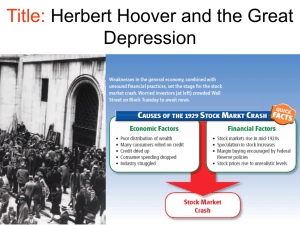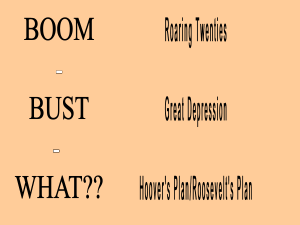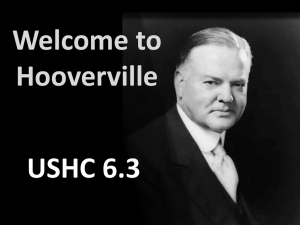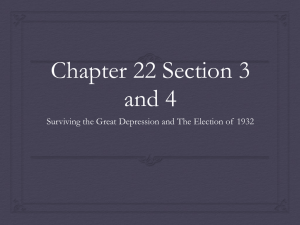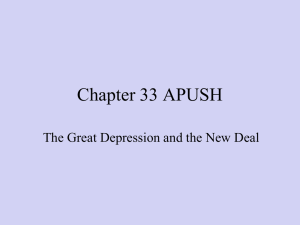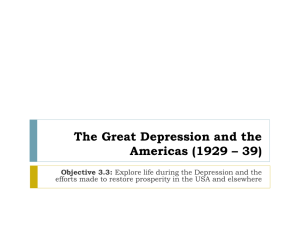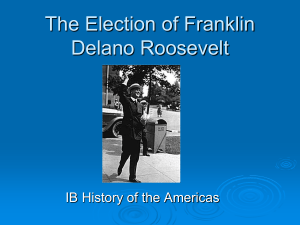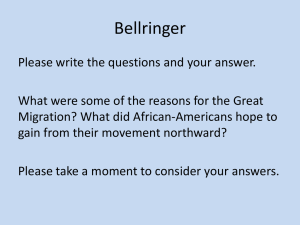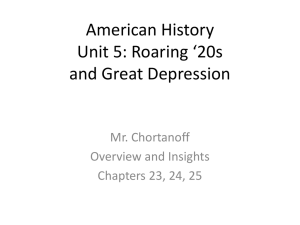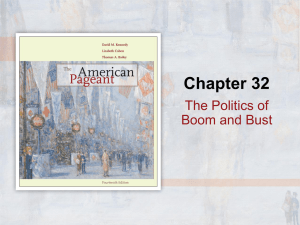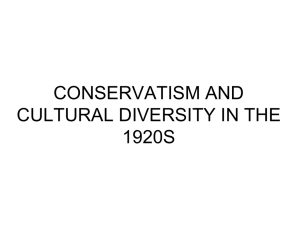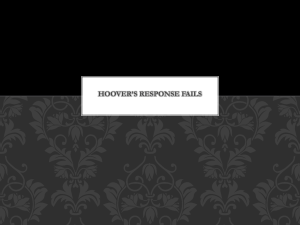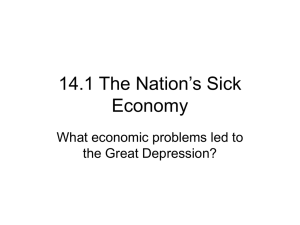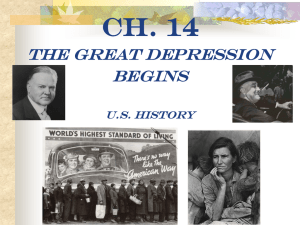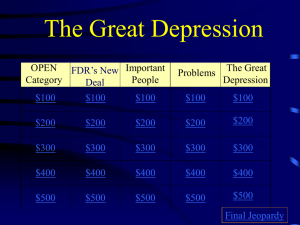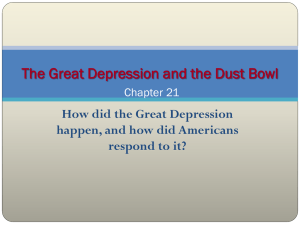Unit 7.2 powerpoint
advertisement
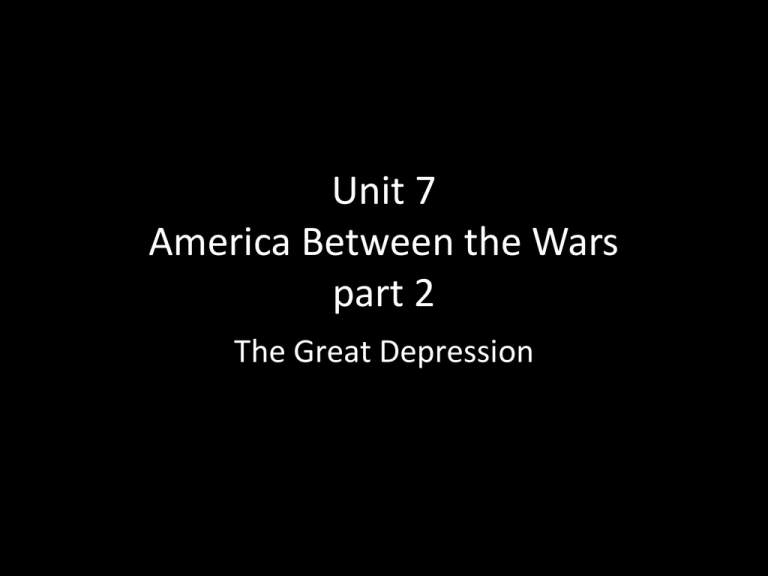
Unit 7 America Between the Wars part 2 The Great Depression • stock market – the place where shares of companies are bought and sold. – Stock = shares in a company • inflation – when prices go up and the general purchasing power of a dollar goes down. Election of 1928 • Al Smith – He was a four-time governor of NY. – the Democratic candidate for President in 1928 – He lost votes because he was Catholic, and was against prohibition. • Herbert Hoover – Head of the Food Administration during WW I, – Secretary of Commerce under Harding – Republican Presidential candidate in 1928. He won the election Causes of the Great Depression • buying on margin – Buying stock by only paying for 10% and borrowing the rest using the stock as collateral. – If the value of the stock dropped below a certain level, then the stock was reclaimed by the lender. • • • • overproduction of goods outran consumption. over-expansion of credit system Europe never recovered from wwi nature-dust bowl drought in midwest Hoover’s Presidency • Hoover only served one term because the Great Depression started on his watch and he did little to stop it. • Black Tuesday – October 29, 1929. – The day that the Stock market crashed. – the beginning of the Great Depression in the United States. • great depression – Term for the massive economic decline in the United States from 1929 to the early 1940s. – During this time unemployment rose from 3% to 25%. Hoover’s Presidency • Supply-side economics – Also known as Trickle down economics – Economic theory that reducing taxes will allow more money for consumers to spend in an economy. – It is what Herbert Hoover practiced in an attempt to correct the Great Depression. • Hawley-Smoot Tariff – Extremely high tariff act passed under Hoover that killed international trade and deepened the Great Depression. Hoover’s Presidency • Reconstruction Finance Corporation (RFC) – Hoover-sponsored federal agency that provided loans to hard-pressed banks and businesses after 1932. – It was ultimately too little, too late to earn Hoover reelection. • Hoovervilles – Shantytowns set up by those who lost their homes during the Great Depression. – They were named after the president whom many blamed for their financial distress. Hoover’s Presidency cont. • Adjusted Compensation Act – It promised every former soldier a bonus that due in 20 years. – It was to make up for lost wages during WW I. • Bonus March – Term for over 20,000 unemployed veterans who went to Washington, D.C. to demand their bonus checks early from the Adjusted compensation act. – Also known as the Bonus Expeditionary Force. – They were eventually forced to leave. Election of 1932 • election of 1932 – Democrats nominated Franklin D. Roosevelt – Republicans nominated Herbert Hoover again – Hoover was so disliked by Americans and blamed for the Depression that Roosevelt won in a landslide. • Franklin D. Roosevelt – Former New York governor – roused the nation to action against the depression with his New Deal legislation and frequent "fireside chat" radio broadcasts. – He won the Presidency in 1932 and 1936. FDR’s Presidency • Brain Trust – The term for FDR's most trusted advisors that he leaned on heavily for economic advice. • Frances Perkins – Roosevelt's secretary of labor – America's first female cabinet member FDR’s Presidency • Banking Holiday – Roosevelt-declared closing of all U.S. financial institutions on March 6-10, 1933 – in order to stop the problem of runs on banks and prepare reforms • Keynesian economics – Named after British economist John Maynard Keynes – it states that governments should defect spend to stimulate a struggling economy. – It is what FDR practiced FDR’s Presidency • New Deal – The term used to describe FDR's whole reform program that he used to combat the Great Depression. • Three R's of the New Deal – relief, recovery, and reform • Hundred Days Congress – The term for the special session of congress called by FDR during his first 100 days in office as President – most of his New Deal reforms were passed. • dust bowl – A massive drought in the midwest caused by a combination of overproduction and lack of rain. – The soil was leeched of all nutrients and was no longer capable of producing crops. – Many lost all that they owned and moved west to California. • John Steinbeck – Writer whose best-selling novel, The Grapes of Wrath – portrayed the suffering of dust bowl "Okies" in the Thirties New Deal - Recovery • Agricultural Adjustment Association (AAA) – New Deal farm agency that attempted to raise prices – payedfarmers to reduce their production of crops and animals. – The idea was to create scarcity to drive prices back up. – It was considered a recovery program. – This was the birth of the modern farm subsidy program. New Deal - Relief • Civilian Conservation Corporation (CCC) – The early New Deal relief agency – that worked to solve the problems of unemployment and conservation – employing youth in reforestation and other socially beneficial tasks. – 2 million were employed in this program. • Works Progress Administration (WPA) – Large federal employment relief program, – established in 1935 under Harry Hopkins – provided jobs in many fields including Art, construction, and history. – 8.5 million people were employed New Deal - Reform • Security and Exchange Commission (SEC) – New Deal reform agency – established to provide a public watchdog against deception and fraud in stock trading • Federal Deposit Insurance Incorporation (FDIC) – created by the Glass-Stegall Banking act, – it provided reform for the banking industry. – It set up insurance on bank deposits to prevent losing money if a bank went under. New Deal Cont. • Social Security Act – New Deal program that had components of all three R's. – It financed old-age pensions, unemployment insurance and other forms of income assistance. – It was a rejection of Social Darwinism. • Tennessee Valley Authority (TVA) – New Deal Federal agency that produced low-cost electrical power for rural areas of the Tennessee River Valley. Critics of the New Deal • Huey P. Long "Kingfish” – Louisiana senator and popular mass agitator who promised to make "every man a king" at the expense of the wealthy. – He was a strong critic of FDR. – He proposed a "share the wealth" program. – He was assassinated. • Father Coughlin • Nine Old Men • Court Packing Plan – Roosevelt's scheme for gaining Supreme Court approval of New Deal legislation by adding three more justices to the Supreme Court. – It was rejected.
